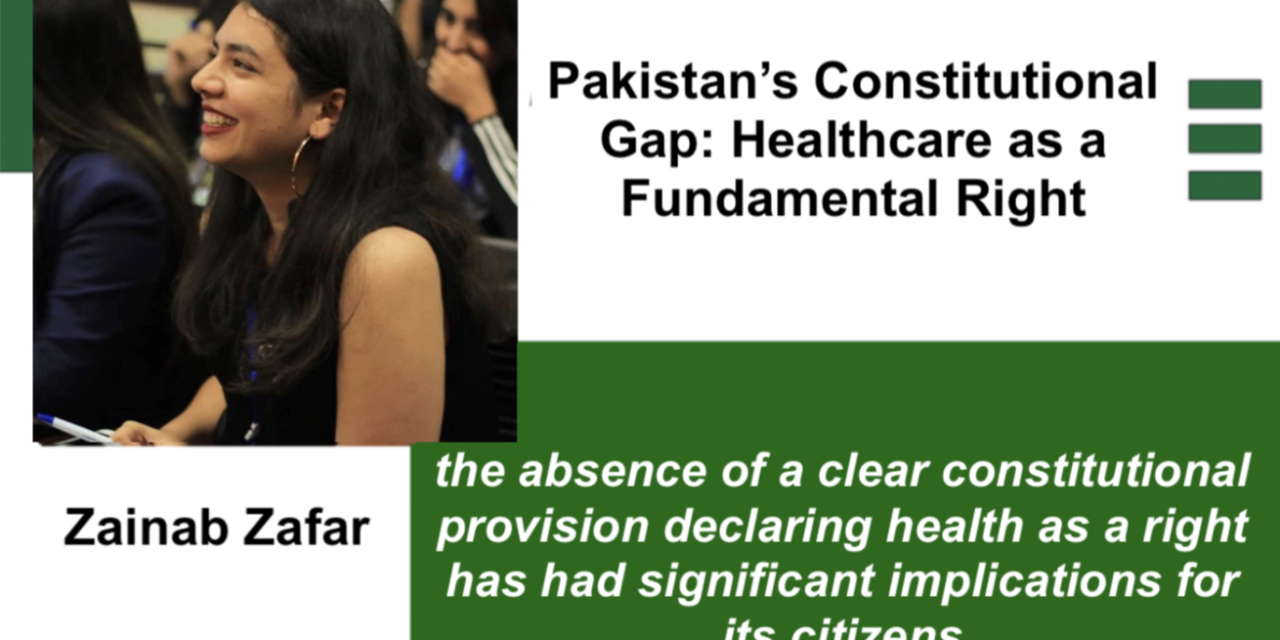Access to healthcare is a fundamental human right, recognised and enshrined in the constitutions of many nations around the world. However, in Pakistan, the absence of a clear constitutional provision declaring health as a right has had significant implications for its citizens. By omission of this fundamental right from the constitution, the legal right to healthcare as well as responsibility of the state to provide for healthcare to all its citizens is hindered.
The provision of healthcare is not only a basic human right but is recognised internationally in this capacity. The Universal Declaration of Human Rights (1948) declared under article 25 that ‘everyone has the right to a standard of living adequate for the health and well-being of himself and his family, including food, clothing, housing and medical care’. Yet, in its 76 years of independence, we have failed our citizens by categorizing healthcare as a privilege rather than a right.
The United Nations Sustainable Development Goals (SDGs) represent a global commitment to address challenges to vulnerable communities and overall development problems. SDG 3 Good Health and Well-being, Pakistan’s lack of inclusion of health as a fundamental right poses a great challenge to achieving Vision 2030 but also is a testimony to the state’s constant categorisation of certain citizens being secondary, where privilege determines safe access.
By not explicitly recognising healthcare as a fundamental right it obstructs the practical implementation of policy and healthcare provisions. The disparities in healthcare attest to the detrimental effects of our constitutional deficiency. Barriers to healthcare disproportionately affect marginalized communities. The National Institute of Health in 2018 saw 30% of children in rural areas were malnourished compared to 19% in Urban areas and 2022 reported the Maternal Mortality rate in rural areas to be 199/100,000 live births compared to 158 in Urban Areas.
The expansion of programmes such as E-clinics in rural areas has been a milestone in achieving equal healthcare. However, with every solution, there must be adequate consideration of the cultural impact and practical implementation. For e-clinics to meet their full potential there needs to be an equal effort towards bridging our digital divide, easy guides to the usage of technology, and safe affordable transport to physical clinics if needed.
Currently, Pakistan ranks 88th out of 89 countries in the 2023 Health Care Index. In 2020 Pakistan spent 2.95% of its GDP towards healthcare while the World Health Organisation recommends 6%. Inadequate funding results in a shortage of facilities and skilled professionals. Without prioritizing the needs of the citizens we stray further away from an equal Pakistan. In a country where 69,000 individuals die from Tuberculosis every year and one of the only two countries in the world still suffering from WPV1 (Wild Poliovirus Type 1), it is unfortunate to see healthcare denied due to fiscal and cultural barriers.
Pakistan to expanded its healthcare provision under the National Health Vision 2025 aiming to provide universal access to quality essential health services. This took a provincial approach, seeing how each devolved power could provide for regional change. The curation of a responsible health system should be a constitutional responsibility, even at a provincial level there needs to be legal recognition, active implementation and resources to overcome barriers such as fiscal needs.
The Sustainable Development Goals, under SDG 3 aim for Universal Health Coverage (UHC). According to the SDG index, Pakistan’s last recorded UHC index was valued at 45% in 2019. Provincially, the Federal Capital Territory and Punjab saw the highest percentage for UHC in 2021 whereas Gilgit Baltistan and Balochistan were on the lower end. The distribution of resources as well as provincial priorities are different. This unequal provision of healthcare sets Pakistan back in achieving SDG 3.
Major challenges remain until Pakistan can achieve universal health coverage, however, at a basic level of ensuring we lower our maternal mortality rates, child mortality rates, work towards immunization coverage and healthcare worker density, inclusion of health as a fundamental right puts us on the right path. Encompassing healthcare into our constitution directly will aid Pakistan in sculpting a better blueprint for its healthcare service provision.
Equally, to achieve Health equity, focus on local governments is essential. Ensuring local government elections as well as an effective and timely handover of power will help Pakistan become one step closer to achieving health equity.
The number of preventable deaths in Pakistan is harrowing. From 91,000 children in the country dying from pneumonia which, according to UNICEF, could be lowered by nearly 25% through immunization. Preventable deaths during birth by increasing the number of doctors and midwives and even effective transport will allow us to be closer to achieving not just SDG 3 but it will directly impact SDG 4 by increasing our quality of education, SDG 1 no poverty, SDG 5 gender equality and SDG 10 by reducing inequalities.
From headlines bombarded with lack of beds in hospitals, shortage of medical equipment and death due to late ambulances, the dire need for focus on health care in Pakistan is essential to meet the basic quality of life entitled to every human being.
Writer is a student based in Islamabad


